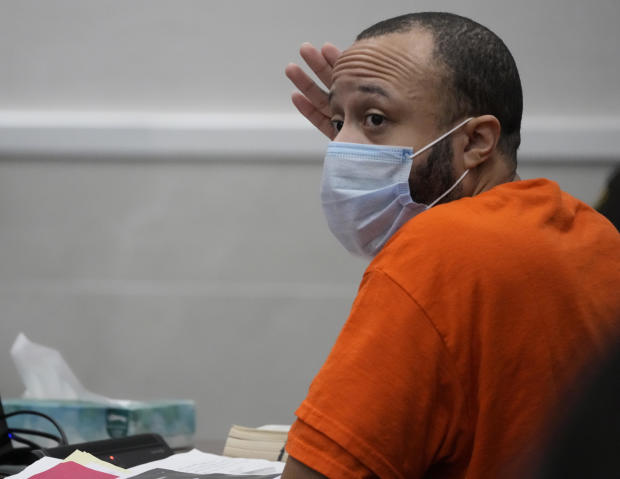Man convicted of killing 6 people with SUV at Christmas parade in Wisconsin
A Wisconsin man was convicted Wednesday of killing six people when he drove his SUV through a Christmas parade last year, ending a trial in which he defended himself erratically and sometimes confrontationally.
The jury found Darrell Brooks guilty of six counts of first-degree intentional homicide. He faces a mandatory life sentence on each count.
The jury got the case Tuesday and deliberated for a total of 3 hours and 15 minutes into Wednesday morning before announcing they had reached a verdict.
Brooks faced a total of 76 charges in connection with the mayhem last November in Waukesha in suburban Milwaukee.
Waukesha County District Attorney Susan Opper focused on Brooks' intent during her closing arguments Tuesday as Brooks' monthlong trial wound down. His failure to stop after hitting the first person in the parade shows he intended to kill people, she said.
"Just stop driving. That's it. It's really that simple. Not one person had to be hurt that day if he would have just stopped driving," Opper said. "He plowed through 68 different people. Sixty-eight. How can you hit one and keep going? How can you hit two and keep going? How can you hit three and keep going? It didn't faze him a bit. He kept going until he got to the end and there were no more bodies to hit."
She concluded her remarks by playing a video of what she said was "the carnage" Brooks caused in the parade.
The livestream The Associated Press has been using to view the trial proceedings did not pan to the video, but Judge Jennifer Dorow appeared to wince at one point while viewing it, and Deputy District Attorney Lesli Boese appeared to choke back tears.
Brooks initially pleaded not guilty by reason of mental disease but withdrew the plea in September without explanation. Just days before his trial began Oct. 3, he dismissed his public defenders and elected to represent himself.
He has spent every day of the trial arguing with Dorow, refusing to recognize his own name and insisting the state has no jurisdiction over him. Multiple times, the judge has had bailiffs move him to another courtroom where he could watch the proceedings via video but she could mute his microphone when he became disruptive.
The judge allowed him to give his closing arguments to the jury in person on Tuesday. He tried to argue that the SUV had been recalled due to a throttle malfunction. After Opper objected - a Wisconsin State Patrol vehicle inspector testified earlier in the trial that the vehicle was in good working order, including the brakes - he suggested the driver might have panicked. He noted that some witnesses testified they heard the SUV's horn honking.
He didn't quite acknowledge he was the driver but said that at night when he's alone in his cell he often asks questions how "this" happened. But he has never asked himself if "this" was intentional because he knows it wasn't. He didn't explain what he was referring to with the word "this."
"Throughout this year I've been called a lot of things," Brooks said. "And to be fair I am a lot of things. A murderer is not one of them."
"You need to look in the mirror, Mr. Brooks," Opper said during her rebuttal. "Your actions are that of a murderer. "
Prosecutors allege Brooks got into a fight with his ex-girlfriend on the streets of Waukesha as the parade was starting Nov. 21, fled in his SUV and drove it into the parade. Opper told the jury that she doesn't know why Brooks entered the parade other than he was enraged.
In addition to the homicide counts, he faces 61 counts of reckless endangerment. Each homicide count carries a mandatory life sentence. Each reckless endangerment count carries a maximum sentence of 17 1/2 years in prison.
Days after the deadly parade crash, the husband of one of the women killed learned from a medical examiner that she had previously undiagnosed uterine cancer.
"I was happy to hear that I could at least give my children the thought that maybe a lot of suffering was avoided," John Kulich told "CBS Mornings" lead national correspondent David Begnaud in November. "At least give my children the thought that, well, maybe God took her so she didn't have to suffer. And if I could just leave them with that."
His wife, Jane, was one of the six people killed when Brooks plowed his SUV into the crowd. She was 52 years old.
"We were a team. That was my partner. I don't know if I'm, I'm not capable of doing all this by myself," he said. "I needed her."
